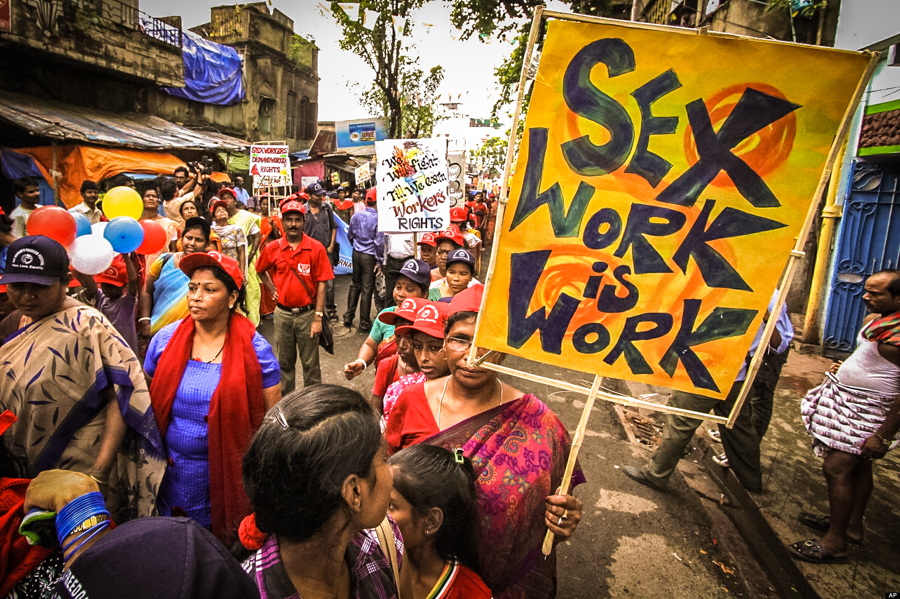SC Order Grants Dignity To Sex Work But It Is Far From Being Decriminalised

The recent Supreme Court directives on guaranteeing sex workers dignity and constitutional freedoms still leaves some critical problem areas unaddressed and these can only be resolved when the profession is decriminalised, say activists and sex workers’ networks. Apart from the right to unionise, these gaps relate to the criminalisation of many activities relating to sex work under the Immoral Trafficking (Prevention) Act (ITPA) – pimping, soliciting, maintaining and running a brothel, they said.
Although voluntary sex work has never been illegal under Indian law, various associated activities essential for sex work are criminal offences under the ITPA. Also, owing to the social stigma associated with the profession, sex workers routinely face harrassment at the hands of both the police and the clients with no recourse to the criminal justice system hitherto.
However, the directives are a significant step, sex workers groups agree. By exercising its power under Article 142 of the Indian Constitution, the court issued a series of directives to safeguard sex workers’ right to live and work with dignity:
- Police authorities must not interfere with or take criminal action against adult sex workers consensually practising the profession. Complaints of sex workers must be dealt with fairly.
- States have been directed to survey rehabilitation facilities set up under ITPA to identify and process the release of sex workers who have been detained against their will.
- Sex workers who are survivors of sexual abuse and violence should be treated like any other survivor of sexual violence.
- Electronic and print media have been prohibited from revealing the identities of sex workers during arrests, “rescue” and “raid” operations.
- In case of a raid on a brothel, the sex workers concerned should not be arrested or penalised or harassed or victimised, since voluntary sex work is not illegal.
- Measures that sex workers employ for their health, such as the use of condoms, must neither be construed as offences nor seen as evidence of commission of an offence.
The order was issued in a hearing in the criminal appeal case of Budhadev Karmaskar, a man convicted of the murder of a sex worker in 1999. While Karmaskar’s sentence was upheld, the court used the hearings in the case to look into ways of improving the lives of sex workers.
The current judgement is the result of the concerted efforts of sex worker groups and collectives across the country; two of who Durbar Mahila Samanwaya Committee (DMSC) and its affiliate Usha Multipurpose Cooperative Society (USHA) were parties to the case and whose recommendations were sought by the Supreme Court. These groups worked towards gathering evidence to support their arguments in the court and have filed numerous appeals to secure sex workers’ access to basic necessities, including ration, cash transfers and documentation.
Sex workers’ demands
The order minimises the effects of the existing criminal law that covers all acts that are integral to sex work – such as soliciting in public and renting property for sex work, said Prabha Kotiswaran, professor of law and social justice at King’s College, London. “Women doing sex work often get hauled up for just going about their daily lives. For instance, they are often humiliated for dropping off their children to school and the mere possession of condoms can give rise to the assumption of soliciting and prior to the order could have been construed as evidence of a punishable offense,” she said.
The new directives do not, however, change the status of sex work in India, Kotiswaran clarified, which has been the demand of sex worker networks.
“This order is only a first step in the direction of decriminalising sex work,” said Ayesha Rai, a sex worker and a member of the Veshya Anyay Mukti Parishad (VAMP), a collective of 5,000 sex workers in Maharashtra and Karnataka.
For sex work to be decriminalised, any legislation that targets and criminalises sex work will have to be repealed such as the ITPA provisions we referred to earlier, said Kotiswaran. For legalisation of sex work, specific rules pertaining to sex work would need to be put in place. There could be a special statute, for example, a labour law on sex work, or licensing law or municipal law that treats sex workers as a separate category of workers who have to abide by its regulations, she said.
“While some groups demand decriminalisation, others demand recognition for sex work as a form of labour. This is to secure their right to unionise,” she said.
End goal vs short-term aims
While legalisation should be the end-goal, total decriminalisation of sex work is a more practical short-term goal for the movement, said trans rights and RTI activist Vyjayanti Vasanta Mogli. “The demand for immediate legalisation will face massive opposition from the government because it will have a cascading effect on the state authorities who will be tasked with the responsibility of ensuring that all sex workers have access to provident fund, gratuity, and that all labour laws kick in. While this is long overdue, total decriminalisation that gives sex workers the right to unionise and self-regulate along with financial assistance from the state to secure their health rights – like in Australia – looks more plausible at the moment.”
The order has opened up an avenue for sex workers to voice their concerns, said Kiran Deshmukh, a sex worker living with HIV and current president of the National Network of Sex Workers (NNSW). The organisation will continue to work for the decriminalisation of sex work, said Deshmukh. “Factories are not shut down if evidence of exploitation emerges. Similarly we are demanding that instead of abolition, sex work should be decriminalised so that we can regulate and put exploitative practises to end,” she said.
Sex workers like Rai and Deshmukh are demanding safe working conditions. “We should have the right to practise our profession freely without fear of legal reprobation. Further these rights should apply to us even if we migrate from one state to another. The Indian Constitution guarantees us the right to work and earn a livelihood in any part of the country,” said Deshmukh.
Access to justice
About one-fifth of India’s sex workers are attacked four times a month on an average; with those having a larger clientele and higher income being more likely to be victims of sexual violence, according to a study by a Bengaluru-based nonprofit Swasti.
Street-based and home-based sex workers are especially prone to exploitation and abuse by their clients, said Jayshri Koli, a sex worker from Maharashtra. “Earlier sex workers could not even get a complaint registered at the police station fearing disclosure of their identity to their families. But with the Supreme Court’s order, the police are now bound to maintain confidentiality. Even at the time of raids, sex workers can now maintain and inform the police that they are consensually engaging in sex work.”.
The court’s order to treat sex worker survivors of sexual violence at par with other survivors is a huge relief, said Deshmukh. “Oftentimes, clients take the worker home and then call in other men who rape the worker. But now survivors will be able to step forth and register a complaint,” she said.
The perpetrators of violence against sex workers are not only clients, but also police personnel, sex workers told Behabox. “We could not have complained about police brutality/violence against sex workers earlier. But the Supreme Court order has made space for us to seek justice,” said Rai.
While violence against trans sex workers finds its root in transphobia, state violence against female sex workers is fueled by the stigma attached to the profession, said Mogli. “In case of trans sex workers, the violence they face is custodial in nature. They are detained and tortured in police lock-ups if they are ‘caught’ soliciting or creating ‘nuisance’. They are also imprisoned under charges of extortion, where too they face violence” she said.
What does the order mean for gender non-binary sex workers? “While the order itself does not say rape and uses the term sexual assault, the existing criminal law with its gender specific definitions of rape can exclude trans and gender non binary persons from accessing the justice system,” said Kotiswaran.
Coerced vs voluntary sex work
Anti-trafficking laws and groups often conflate trafficking and sex work, pointed out experts.
“In purely legal terms, the ITPA does not draw a distinction between coerced and voluntary sex work. It is assumed that anyone engaging in sex work has essentially been trafficked into the profession,” said Kotiswaran. “Further it is implemented disproportionately against sex workers. It completely exonerates the clients. Various High Courts have previously held that the customers cannot be held legally liable. There is something about the way that the criminal law is implemented in our country which makes women face the worst brunt of it.”
“Rescue” operations carried out as part of anti-trafficking campaigns under ITPA are dehumanising, said trans activist Rachana Mudraboyina. “These operations are accompanied by physical and verbal abuse, and make for a humiliating experience for the sex workers who are purportedly being ‘rescued’,” she added.
Sex workers and experts argue that anti-trafficking laws have long been used by the government to infantilise sex workers who enter the profession of their own free will. Those arrested during rescue and raid operations are placed in rehabilitation facilities, as we said earlier. “Sex workers languish in corrrectional facilities for years against their will for choosing the profession of sex work. They counsel us and attempt to coerce us into choosing other professions,” said Rai.
Almost 80% of sex workers picked up during rescue and raid operations in districts of Kerala, Karanataka, Maharashtra and Jharkhand between 2015 and 2017 reported having voluntarily engaged in sex work, found a 2018 study titled ‘Raided’. Among these were women who were detained in rehabilitation facilities for six months to three years.
The report also found that 79% of the women who left protection homes returned to sex work. “Women often lie about leaving sex work do so only so they can leave rehabilitation homes. But they go back to sex work. The recent order has given women space to exercise their autonomy and say that they have chosen this profession as an adult,” said Koli.
The government often maintains that women who are trafficking survivors are almost always unaware of their situation but this is illogical, argued Mogli. “Women who keep testifying in courts that they have been practising sex work out of their own volition cannot be told that they have been brainwashed to the extent that they do not even know what they are talking about,” she said.
Historical Context
In 2011 the criminal appeal case of Budhadev Karmaskar, the man who had been found guilty of killing a sex worker, was heard by the Supreme Court. The verdict was upheld by the court. The judges directed that a panel be constituted to look into ways of preventing trafficking and rehabilitating sex workers who wish to leave sex work. The panel was also tasked with looking into conditions conducive to sex workers to live with dignity in accordance with the provisions of Article 21 of the Constitution of India.
After years of deliberations and discussions with multiple stakeholders, the panel submitted a report. In 2016, the government informed the court that a draft legislation was published incorporating the recommendations made by the panel. Since then the government has been seeking adjournments on the grounds that the bill is under discussion.
However sex workers groups continued to submit recommendations to and file appeals in the Supreme Court during this while. The pandemic and the ensuing lockdown that left sex workers with no livelihood options and pushed many to the brink of starvation, also helped in catalysing the sex workers’ demands for safety nets.
In 2020, DMSC mobilised and filed an application in the apex court to demand a monthly ration supply and cash transfers for sex workers. The court then directed states to provide dry rations to sex workers without insisting on proof of identity. A year later, the court also ordered the central and state governments to “immediately” issue ration cards, voter identity cards and Aadhaar numbers to sex workers so that they can access welfare schemes.
We believe everyone deserves equal access to accurate news. Support from our readers enables us to keep our journalism open and free for everyone, all over the world.




